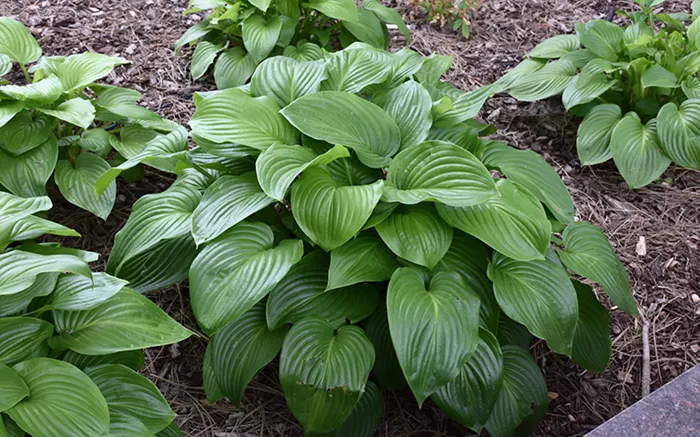Hosta plants, commonly known as plantain lilies, belong to the genus Hosta within the family Asparagaceae. They are cherished in gardens for their lush foliage and beautiful flowers, which bloom in various shades of lavender, white, and blue. Native to East Asia, hostas thrive in shaded areas and are often used as ground cover or border plants in landscapes.
These perennials are renowned for their wide variety of leaf shapes, sizes, and colors, ranging from deep green to vibrant gold. Their ability to adapt to different soil types and moisture levels makes them a favorite among gardeners. Hostas are not only aesthetically pleasing but also relatively low-maintenance, making them an ideal choice for both novice and experienced gardeners.
However, as much as they add beauty to gardens, there is an important consideration for pet owners: the potential toxicity of hosta plants to dogs.
Are Hosta Plants Poisonous To Dogs?
Yes, hosta plants are considered mildly toxic to dogs. The primary toxic components found in hostas are saponins, which are naturally occurring chemicals that can cause gastrointestinal distress when ingested. While hostas are not lethal to dogs, consuming any part of the plant can lead to unpleasant symptoms.
It is crucial for dog owners to be aware of the risks associated with having hostas in their gardens. Dogs are naturally curious creatures and may chew on or ingest plant material while exploring their surroundings. Understanding the potential hazards can help pet owners take preventive measures.
Causes of Hosta Plant Poisoning To Dogs
The toxicity of hostas primarily stems from the presence of saponins. These compounds serve as a natural defense mechanism for the plant against herbivores and pests. When ingested by dogs, saponins can disrupt normal digestive processes.
Dogs may encounter hosta poisoning through various means:
Chewing on Leaves: Dogs often chew on leaves out of curiosity or boredom.
Digging: While digging around hostas, dogs may accidentally ingest parts of the plant.
Playing: Playful interactions with hostas can lead to accidental ingestion.
The risk of poisoning increases if a dog consumes a significant amount of the plant material. Therefore, monitoring your dog’s behavior around hostas is essential.
Symptoms of Hosta Plant Poisoning To Dogs
If a dog ingests hosta plant material, several symptoms may manifest:
Vomiting: One of the most common reactions is vomiting, which occurs as the body attempts to expel the ingested toxins.
Diarrhea: Gastrointestinal upset often leads to diarrhea, which may be accompanied by abdominal pain.
Lethargy: Affected dogs may exhibit signs of lethargy or decreased energy levels.
Loss of Appetite: Dogs may refuse food due to nausea or discomfort.
In some cases, more severe symptoms such as blood in stool or persistent vomiting may occur. If you notice any concerning signs after your dog has been near hostas, it is essential to consult a veterinarian promptly.
Treatments for Hosta Plant Poisoning To Dogs
If you suspect that your dog has ingested part of a hosta plant, immediate action is necessary:
Remove Access: Ensure that your dog cannot access any more hosta plants.
Monitor Symptoms: Keep a close eye on your dog’s behavior and any symptoms that arise.
Contact a Veterinarian: If symptoms appear mild (e.g., occasional vomiting or diarrhea), you may not need immediate veterinary intervention. However, if symptoms worsen or persist, contact your veterinarian or an animal poison control center for guidance.
Inducing Vomiting: Do not attempt to induce vomiting without professional advice, as this could cause further complications.
Veterinary Treatment: In severe cases where symptoms escalate (e.g., blood in stool), your veterinarian may recommend treatments such as intravenous fluids or medications to alleviate gastrointestinal distress.
Recovery from Hosta Plant Poisoning To Dogs
Most dogs will recover from mild cases of hosta poisoning with proper care and monitoring. Recovery times can vary based on the amount ingested and individual health factors.
Hydration: Ensuring your dog remains hydrated is vital during recovery.
Rest: Allow your dog plenty of time to rest and recuperate.
Dietary Adjustments: Your veterinarian may recommend a bland diet until your dog’s digestive system stabilizes.
Regular follow-up with your veterinarian can help ensure that your dog returns to normal health after experiencing any adverse effects from hosta ingestion.
3 Frequently Asked Questions Answered
1. Can all parts of the hosta plant be harmful to dogs?
Yes, all parts of the hosta plant contain saponins and can potentially cause gastrointestinal upset if ingested by dogs. While some parts may be more palatable than others, it is best to prevent access entirely.
2. How much hosta does it take to cause poisoning?
The amount required to cause poisoning varies depending on the size and health of the dog as well as the specific species of hosta consumed. Even small amounts can lead to mild symptoms; larger quantities increase the risk of more severe reactions.
3. Are there any safe alternatives to hostas for pet owners?
Yes! If you have pets and want similar aesthetic appeal without toxicity concerns, consider planting non-toxic alternatives such as ferns (e.g., maidenhair fern), caladiums, or certain varieties of daylilies that are safe for dogs.
Conclusion
In conclusion, while hosta plants add beauty and elegance to gardens with their lush foliage and stunning blooms, they pose potential risks for dog owners due to their mild toxicity. Understanding the implications of having these plants around pets is essential for maintaining a safe environment.
By being proactive—monitoring your dog’s behavior around plants and seeking veterinary advice when necessary—you can enjoy the beauty of hostas while ensuring your furry friends stay healthy and happy. As you cultivate your garden with care and consideration for both aesthetics and pet safety, you create a harmonious space where both plants and pets can thrive together!


